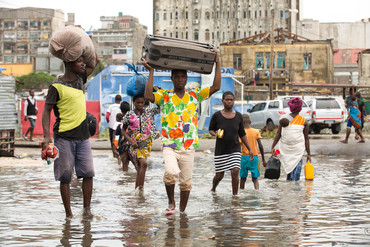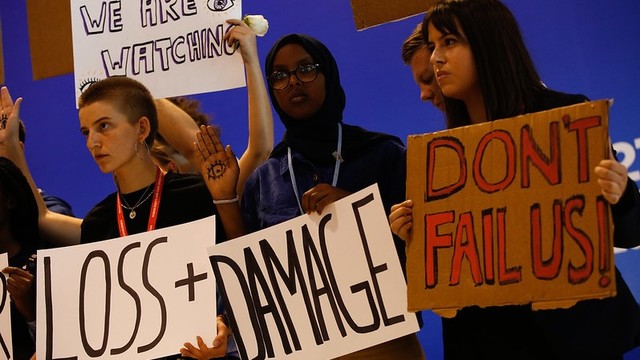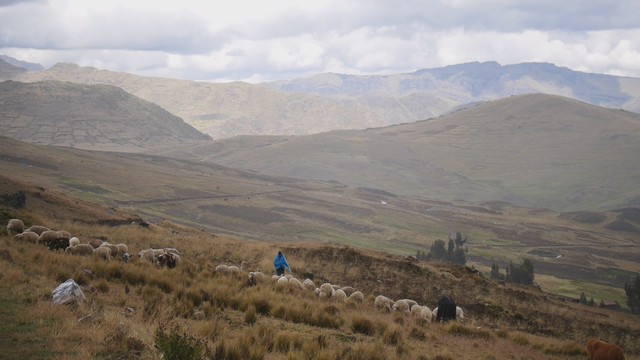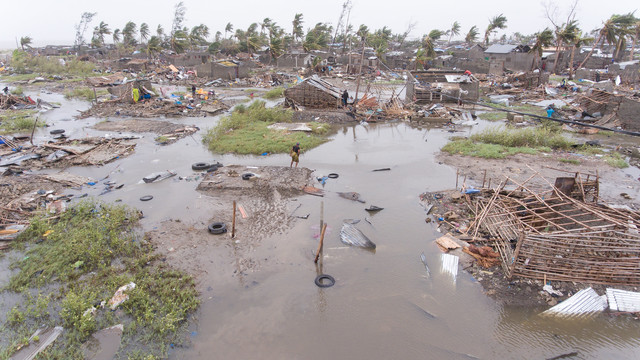Addressing loss and damage: actions to respond, recover and reduce the risk
This event launched a new report which examines the risk of loss and damage and the tools, measures and mechanisms used to address it

Bangladesh is particularly vulnerable to the effects of climate change, including cyclones, flooding, salinisation and coastal erosion. During a flood in 2019 about five million people were affected (Photo: UN Women Asia and the Pacific via Flickr, CC BY-NC-ND 2.0)
Loss and damage is happening now and will only escalate with every increment of global warming. Despite the scale of this gathering crisis, limited action is being taken to address the risks of loss and damage the most vulnerable countries and communities face, who are already being hit by climate shocks with increasing frequency and intensity.
In this IIED Debates event, we explored what type of action affected and at-risk countries and communities can take to address loss and damage and how they can mobilise finance to support those actions.
The latest report of the Intergovernmental Panel on Climate Change (IPCC) shows that we already live in the era of losses and damages. In 2021 alone, extreme weather events around the world shattered records, displaced millions and killed thousands. If action is not taken urgently, effectively and at scale to address the losses and damages caused by these shocks, billions of people will become exposed to catastrophic risks.
To date, attention to the issue of loss and damage has focused on political questions of compensation, reparations and responsibility, and have been largely confined to climate negotiations. As losses and damages mount across the global South, we ask how national and local actors and communities can take action now to address the loss and damage impacts and risks that are affecting them.
This online IIED Debates event launched a new report that explores the loss and damage risks that communities face. Working with partners and allies from at-risk countries across the global South, we have identified seven key features of loss and damage risk and ten attributes of good practice that should be considered and used to guide the design and delivery of actions to address loss and damage.
Speakers from IIED, the IPCC, the Climate Vulnerable Forum, the Least Developed Countries (LDC) Group of negotiators, the Scottish government and affected communities reflected on the current situation of loss and damage in the global South. Our panel shared the lived experiences of communities facing loss and damage and explored the range of solutions that governments and civil society organsiations can adopt.
- What measures do countries and communities already have that respond to, recover and reduce the risk of loss and damage now and in the future?
- How can we overcome the political challenges that impede loss and damage action at the international level?
- And how can we access and mobilise finance to reach the right solutions, in the right place at the right time to aid the people that need support the most?
Download the report: Addressing loss and damage: practical insights for tackling multidimensional risks in LDCs and SIDS
About the speakers
- Simon Addison (moderator) is a principal researcher in IIED's Climate Change research group and team leader for public policy for climate-resilient development
- Clare Shakya (keynote speaker) is director of IIED’s Climate Change research group and works on improving access to climate finance as well as on its quality and quantity
- Jemima Gordon-Duff (keynote speaker) is the deputy director for international climate change for the Scottish government
- Ritu Bharadwaj (report author) is a principal researcher in IIED’s Climate Change research group with expertise in social protection, climate resilience, watershed and forest management, migration, gender and food security
- Nora Nisi (report author) is a researcher in IIED’s Climate Change research group and focuses on climate change governance, climate risk management, loss and damage, and locally-led climate-resilient development
- Clara Gallagher (report author) is a researcher in IIED’s Climate Change research group focusing on reforming international climate finance systems
- Anna Carthy (report author) is a researcher in IIED’s Climate Change research group with a research focus on equity in climate adaptation and resilience
- Saleemul Huq (discussant) is the director of International Centre for Climate Change and Development (ICCCAD) in Bangladesh, and is an expert on the links between climate change and sustainable development, particularly from the perspective of developing countries
- Emeline Siale Ilolahia (discussant) is the executive director of the Pacific Islands Association of Non-Governmental Organisations (PIANGO)
- Emily Boyd (discussant) is a professor in sustainability studies for Lund University Centre for Sustainability Studies and a leading social scientist with a specialist focus on environment and climate change
- Hafij Khan (discussant) is an advocate of the Supreme Court of Bangladesh, co-coordinator of the loss and damage team for the LDC Group at the UNFCCC, and is a member of the Warsaw International Mechanism for loss and damage.
- Heather McGray (discussant) is director of the Climate Justice Resilience Fund which supports women, youth, and Indigenous Peoples to create and share their own climate resilience solutions
Event coverage
A recording of the event is available below or on IIED's YouTube channel, where viewers are also able to use timestamps to go straight to specific speakers.
About IIED Debates
This event is part of the IIED Debates series. Through the convening of expert speakers and external stakeholders, IIED brings together an international community to discuss critical issues.
IIED Debates encompass both physical and digital events, including critical themes, breakfast debriefs and webinars. These events are public and are hosted regularly throughout the year online and when possible in our London and Edinburgh offices.
IIED events newsletter
Sign up to our mailing list for updates and invitations to events throughout the year, including webinars, critical themes and debriefs.
Contact
Juliette Tunstall (juliette.tunstall@iied.org), IIED's internal engagement and external events office





